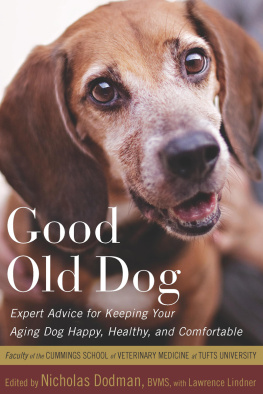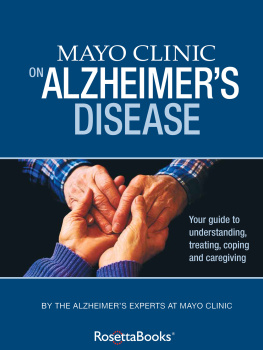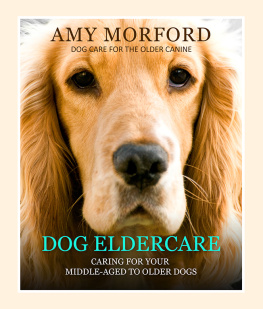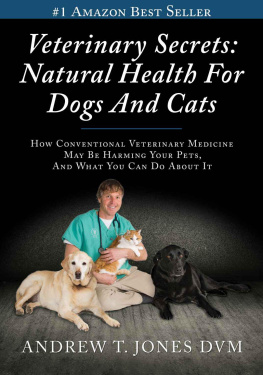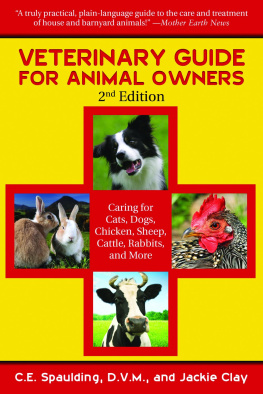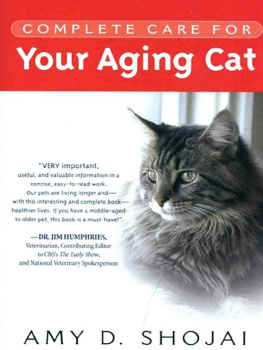Copyright 2010 by Tufts University
All rights reserved
For information about permission to reproduce selections from this book, write to or to Permissions, Houghton Mifflin Harcourt Publishing Company, 3 Park Avenue, 19th Floor, New York, New York 10016.
www.hmhco.com
The Library of Congress has cataloged the print edition as follows:
Good old dog : expert advice for keeping your aging dog happy, healthy, and comfortable / by the faculty of the Cummings School of Veterinary Medicine at Tufts University ; edited by Nicholas Dodman, with Lawrence Lindner.
p. cm.
Includes index.
ISBN 978-0-547-23282-9
1. Dogs. 2. DogsAging. 3. DogsHealth. 4. Veterinary geriatrics. I. Dodman, Nicholas H. II. Lindner, Lawrence. III. Cummings School of Veterinary Medicine.
SF 427. G 66 2010
636.7'089897dc22 2010026066
e ISBN 978-0-547-50448-3
v3.0716
Cover design by Michaela Sullivan
Cover photograph Thank Dog Photography
Illustration credits appear on .
While this book is based on extensive scientific research and contains instructions and safety precautions based on that research and on clinical experience, it is not intended to replace the services of a veterinarian. An essential element of taking responsibility for your pets health is having scheduled checkups and, when its deemed necessary, emergency visits with your veterinarian. The authors, Tufts University, and the publisher disclaim any responsibility for any adverse effects resulting directly or indirectly from information contained in this book.
A Note to the Reader
W E TRY HARD in Good Old Dog never to refer to a dog as an it. Your canine companion is not an it, but rather a he or she. Which pronoun to use, however? The exclusive use of either one leaves out half the canine population. And constant use of he or she/him or her language construction makes reading cumbersome. To get around the problem, we alternated. In the odd-numbered chapters, dogs are referred to with female pronouns; in the even-numbered chapters, with male pronouns.
We did the same for veterinarians, referring to them with female pronouns in the chapters with odd numbers and with male pronouns in those with even numbers.
Preface
T HE VERY IDEA of a dogs old age is relatively new. It wasnt too many generations ago that dogs were still viewed largely as utilitarian workers, nonsentient creatures bred to keep a flock of sheep in line or spot prey. The notion of a dog having a comfortable, happy old age would never even have been considered.
Now, dogs are full-fledged members of the household, with a strong reciprocity of feeling between pet and ownerso much so that research has shown that having a dog in the home reduces blood pressure and, thereby, the risk for heart disease. Dog owners even report improved psychological well-being, largely attributable to reduced feelings of loneliness and isolation, as well as a reduction in stress. We know; most of us number among them.
Surely, many of those positive associations come from the relationships people develop with their pals as the years pass. Theres something more serene, wiser, about an older dog, even one who still has plenty of energy. A dog youve had for more than just a handful of years can simply understand you better, accommodate your moods better.
Of course, too, theres extra closeness with a dog youve known for a long time. How could the bond not strengthen after ones four-legged friend has turned seven, ten, twelve years old? After all, the better part of a decade or more has been spent nurturing the relationshiphelping the dog grow from a baby who needed to be taught the rhythms of your home to a mature soul who can easily read your mood and provide comfort, protection, or simply good company whenever it is needed.
Perhaps you and your older dog have watched children go off to college together, grieved a loss, relocated, or dealt with a career change. Surely, youve taken walks by each others side, watched favorite TV shows, greeted each other enthusiastically after a long day apart, and been a reassuring presence to each other at bedtime.
During checkups and other visits, we see the closeness in the way people interact with their more senior companions. Theres a comfort level, a something that can be taken for granted, that isnt yet present between people and their younger dogs.
Bring into the mix that a pet is so innocent, so unquestionably devoted and accepting, and its not at all surprising that even the toughest among us might blink back tears at the thought of a faithful companion getting on in years. Such emotion doesnt make us softies or weirdos; it makes us human. Its simply an indication that were able to respond to all the depth of feeling a companion dog is able to elicit.
No wonder it has become important for people to increase not only a dogs life span but also their pets health span, changing what it means to be geriatric.
By the numbers, geriatric signifies the point at which 75 percent of ones anticipated lifespan has gone by. The good newswhat this book is aboutis that passing that milestone no longer means over the hill. Sophisticated advances in veterinary medical technology help dogs remain healthier for much longer even as they reach significantly older ages, thereby compressing the amount of time a dog will be infirm or uncomfortable before reaching the end of life. Thus, just as silver-haired men and women in their seventies and eighties now go traveling and white-water rafting and lead active, fulfilling livessomething that was once largely unthinkabletwelve-, fourteen-, and sixteen-year-old dogs can now continue to enjoy their usual romps and shenanigans with the help of modern veterinary medicine.
Fifteen years ago, if you told someone you were taking your dog to the radiology department of an animal hospital for a CT scan or perhaps even an MRI, that person would likely have looked at you as if you were crazy. Today, neither procedure is considered rare or experimental. In fact, CT scans for dogs have actually become a lot faster, a good thing because it means they require less anesthesia to keep a dog still during the procedure.
Just a few decades ago, if a dog had a cataract, particularly in a locale away from an urban center, the dog went blind. Today, your pet can undergo ophthalmologic surgery to remove the cataract and save his sight.
Only twenty years ago, many people did not take care of a dogs teeth. By age ten, the teeth would be caked in tartar, and the bacteria that caused infections in the dogs mouth could travel through her bloodstream to bodily organs and potentially shorten her lifespan. Today, dogs are privy to routine dental care. And, since the 1990s, even procedures such as root canals have become more commonplace in order to save a tooth and help keep a canine friend healthy overall. Furthermore, a dog with heart failure can be kept alive with drugs that werent on the market only a couple of years ago. Veterinary researchers are even looking into surgery to replace leaky canine heart valvesa concept that hadnt yet made it to the drawing board when your dog was a pup. No wonder some dogs are now reaching their late teens with verve when it used to be that a dogs reaching sixteen or seventeen was a feat in itself.
Many of these advances are due to a boom in veterinary specialization, with increasing numbers of vets whose focus is strictly on such fields as internal medicine, cardiology, neurology, dentistry, and ophthalmology. Veterinary medical care has in fact been following on the heels of breakthroughs in human medicine, much more so than in the 1970s and 80s, and is comparable in many ways. Some specialtiesfor example, canine orthopedicsare as sophisticated as human orthopedics. In other words, dogs are often in as good a position as humans to be treated for skeletal problems causing pain and immobility, meaning that a dog with, say, severe arthritis no longer has to be euthanized for lack of a better solution.

